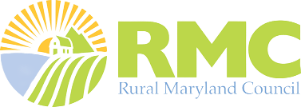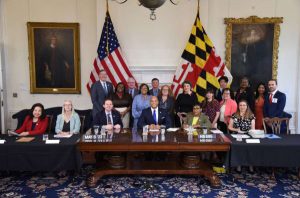Rural Maryland Council celebrates signing of House Bill 695- Rural Maryland Prosperity Investment Fund- Allocation of Grants (Rural Community Improvment Act of 2023
The Rural Maryland Council celebrated the signing of House Bill 695– Rural Maryland Prosperity Investment Fund – Allocation of Grants (Rural Communities Improvement Act of 2023) by Governor Wes Moore on Monday May 8, 2023 at the State House in Annapolis. This bill promotes and expands the Rural Maryland Prosperity Investment Fund to include workforce and cooperative development projects and programs in rural Maryland through a formula-driven grant program administered by the Rural Maryland Council.
“We thank our sponsors Delegates Sheree Sample-Hughes (D-District 37B) and Chris Adams (R-District 37A) for their support,” said Susan O’Neill, RMC Executive Board Chair and Executive Director of the Upper Shore Regional Council.
“The strength of the Council’s impact is dependent on the resources provided to them through the State’s operating budget. The Council members and rural non-profit community leverage these funds with local and federal funds to improve the lives of rural Marylanders’, continued O’Neill. “RMPIF funding allows many rural organizations to provide innovative programming that creates jobs, educational opportunities, and enhances the quality of life in our rural communities. For many nonprofit organizations and stakeholders, RMPIF provides the critical support needed to fuel healthy, resilient rural communities.”
The Rural Maryland Council (RMC) is an independent State Agency housed in the Department of Agriculture. RMC is known as the collective voice for Rural Maryland and its mission is to convene stakeholders to collectively address the needs of rural Maryland communities. The Council administers two grant programs – the Rural Maryland Prosperity Investment Fund (RMPIF) and the Maryland Agricultural and Rural Development Assistance Fund (MAERDAF). This legislation focuses on the RMPIF program. The RMPIF funds are distributed through a highly competitive grant program to the State’s five Rural Regional Councils and programs and projects eligible under entrepreneurship, infrastructure, and health care. A portion of funds are retained by the Rural Maryland Council for operational expenses consisting primarily of staff salaries.
Demand for RMC programs is high. Over the past five years, in Fiscal Year 2019 through 2022, the RMC grant programs have had an average of 155 applicants requesting $10,819,991. With this funding, RMC has funded on average 66 applicants at $6,080,255. In FY2023, RMC received 50% in additional funding and was able to provide more grants that are helping build stronger rural communities. In Fiscal Year 2023, RMC received 215 grant applications totaling $19,130,407, of which 84 grants were awarded totaling $8,369,629. These grant recipient projects have had significant outcomes such as improved education outcomes of at risk, minority children by providing educational summer enrichment programming; supporting general contractor and infrastructure costs for a new 72-unit affordable housing community; expanding broadband internet connections to new homes; and, providing medical transporation, personnel, and services to those in need.
The Council sought to add Cooperative Development and Workforce Development as focus areas under Rural Entrepreneurship and Agricultural Development as a technical update to the RMPIF statute. Through Rural Workforce Development, the Council will support apprenticeships and community colleges so young adults can stay in rural areas and become part of the rural workforce. Efforts to improve career and technology education through the implementation of the Blueprint for Maryland’s Future will be a main component of this program. Through Cooperative Development, the Council will support programs that improve the economic conditions of rural areas by helping individuals and businesses start, expand, or improve rural cooperatives and other mutually owned businesses.
The Rural Maryland Council (RMC) is an independent state agency governed by a nonpartisan, 40-member board that consists of inclusive representation from the federal, state, regional, county and municipal governments, as well as the for-profit and nonprofit sectors. We bring together federal, state, county and municipal government officials as well as representatives of the for-profit and nonprofit sectors to identify challenges unique to rural communities and to craft public policy, programmatic or regulatory solutions.
May 8, 2023 Bill Signing HB695, Joe Andrucyk, Patrick Siebert, govpics.maryland.gov

